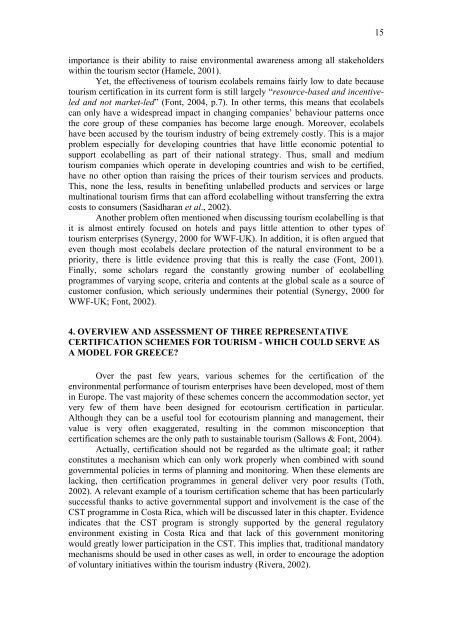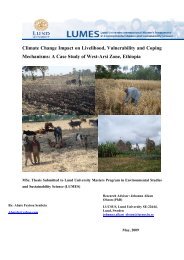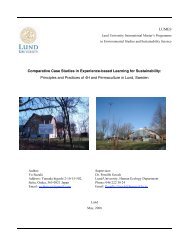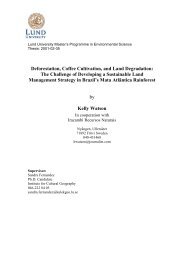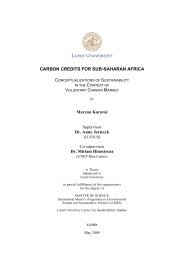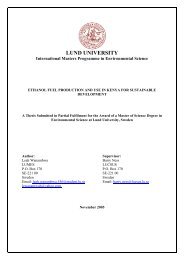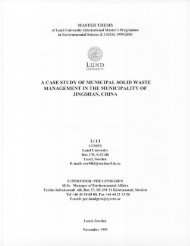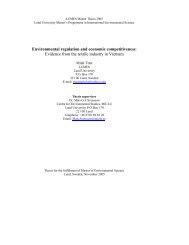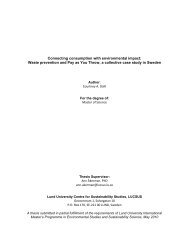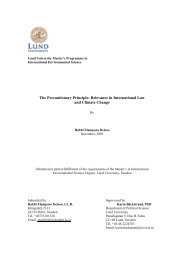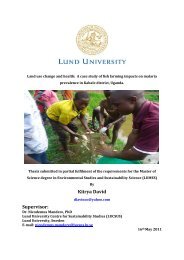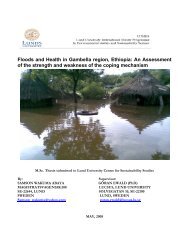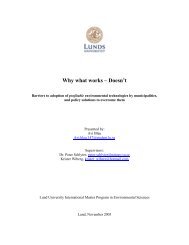Thesis title: âThe development of community-based ecotourism - lumes
Thesis title: âThe development of community-based ecotourism - lumes
Thesis title: âThe development of community-based ecotourism - lumes
You also want an ePaper? Increase the reach of your titles
YUMPU automatically turns print PDFs into web optimized ePapers that Google loves.
15importance is their ability to raise environmental awareness among all stakeholderswithin the tourism sector (Hamele, 2001).Yet, the effectiveness <strong>of</strong> tourism ecolabels remains fairly low to date becausetourism certification in its current form is still largely “resource-<strong>based</strong> and incentiveledand not market-led” (Font, 2004, p.7). In other terms, this means that ecolabelscan only have a widespread impact in changing companies’ behaviour patterns oncethe core group <strong>of</strong> these companies has become large enough. Moreover, ecolabelshave been accused by the tourism industry <strong>of</strong> being extremely costly. This is a majorproblem especially for developing countries that have little economic potential tosupport ecolabelling as part <strong>of</strong> their national strategy. Thus, small and mediumtourism companies which operate in developing countries and wish to be certified,have no other option than raising the prices <strong>of</strong> their tourism services and products.This, none the less, results in benefiting unlabelled products and services or largemultinational tourism firms that can afford ecolabelling without transferring the extracosts to consumers (Sasidharan et al., 2002).Another problem <strong>of</strong>ten mentioned when discussing tourism ecolabelling is thatit is almost entirely focused on hotels and pays little attention to other types <strong>of</strong>tourism enterprises (Synergy, 2000 for WWF-UK). In addition, it is <strong>of</strong>ten argued thateven though most ecolabels declare protection <strong>of</strong> the natural environment to be apriority, there is little evidence proving that this is really the case (Font, 2001).Finally, some scholars regard the constantly growing number <strong>of</strong> ecolabellingprogrammes <strong>of</strong> varying scope, criteria and contents at the global scale as a source <strong>of</strong>customer confusion, which seriously undermines their potential (Synergy, 2000 forWWF-UK; Font, 2002).4. OVERVIEW AND ASSESSMENT OF THREE REPRESENTATIVECERTIFICATION SCHEMES FOR TOURISM - WHICH COULD SERVE ASA MODEL FOR GREECE?Over the past few years, various schemes for the certification <strong>of</strong> theenvironmental performance <strong>of</strong> tourism enterprises have been developed, most <strong>of</strong> themin Europe. The vast majority <strong>of</strong> these schemes concern the accommodation sector, yetvery few <strong>of</strong> them have been designed for <strong>ecotourism</strong> certification in particular.Although they can be a useful tool for <strong>ecotourism</strong> planning and management, theirvalue is very <strong>of</strong>ten exaggerated, resulting in the common misconception thatcertification schemes are the only path to sustainable tourism (Sallows & Font, 2004).Actually, certification should not be regarded as the ultimate goal; it ratherconstitutes a mechanism which can only work properly when combined with soundgovernmental policies in terms <strong>of</strong> planning and monitoring. When these elements arelacking, then certification programmes in general deliver very poor results (Toth,2002). A relevant example <strong>of</strong> a tourism certification scheme that has been particularlysuccessful thanks to active governmental support and involvement is the case <strong>of</strong> theCST programme in Costa Rica, which will be discussed later in this chapter. Evidenceindicates that the CST program is strongly supported by the general regulatoryenvironment existing in Costa Rica and that lack <strong>of</strong> this government monitoringwould greatly lower participation in the CST. This implies that, traditional mandatorymechanisms should be used in other cases as well, in order to encourage the adoption<strong>of</strong> voluntary initiatives within the tourism industry (Rivera, 2002).


